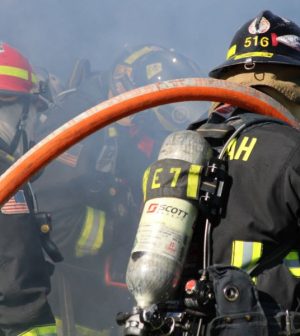- Could Your Grocery Store Meat Be Causing Recurring UTIs?
- Are You Making This Expensive Thermostat Error This Winter?
- Recognizing the Signs of Hypothyroidism
- 10 Strategies to Overcome Insomnia
- Could Artificial Sweeteners Be Aging the Brain Faster?
- Techniques for Soothing Your Nervous System
- Does the Water in Your House Smell Funny? Here’s Why
- Can a Daily Dose of Apple Cider Vinegar Actually Aid Weight Loss?
- 6 Health Beverages That Can Actually Spike Your Blood Sugar
- Treatment Options for Social Anxiety Disorder
Firefighters Exposed to Carcinogens Through the Skin

Firefighters face many known hazards on the job, but one area that hasn’t been well researched is how their skin’s exposure to hazardous chemicals might increase their risk of cancer.
It has long been known that firefighters have higher rates of several types of cancer than people in the general population.
In a new study, researchers at the University of Ottawa examined firefighters’ exposure to polycyclic aromatic hydrocarbons (PAHs) in smoke from fires. PAHs can cause genetic mutations and are known carcinogens. They are one of the hazardous substances released into the air when wood, plastics, furniture, electronics or building materials burn.
The researchers collected urine samples from — and also wiped the skin and clothing of — more than two dozen Canadian firefighters before and after they responded to fires in 2015 and 2016.
On average, the levels of PAH metabolites in urine were about three to five times higher after a fire than before a fire, the findings showed. That increase was associated with an average 4.3 times higher risk of DNA mutations.
“There’s a relationship between firefighters’ urinary PAH metabolite levels and the levels of PAHs on their skin, which leads us to suspect that [skin] contact may be an important route of exposure,” Jennifer Keir, an author on the study, said in a news release from the American Chemical Society.
The researchers suggested that skin decontamination immediately after fighting a fire may help reduce exposure to these potentially cancer-causing compounds.
The study was published Oct. 18 in the journal Environmental Science & Technology.
More information
The U.S. National Institute for Occupational Safety and Health has more on firefighters.
Source: HealthDay
Copyright © 2026 HealthDay. All rights reserved.










